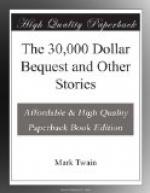But she was interrupted by a visitor. It was the editor and proprietor of the Sagamore. He had happened into Lakeside to pay a duty-call upon an obscure grandmother of his who was nearing the end of her pilgrimage, and with the idea of combining business with grief he had looked up the Fosters, who had been so absorbed in other things for the past four years that they neglected to pay up their subscription. Six dollars due. No visitor could have been more welcome. He would know all about Uncle Tilbury and what his chances might be getting to be, cemeterywards. They could, of course, ask no questions, for that would squelch the bequest, but they could nibble around on the edge of the subject and hope for results. The scheme did not work. The obtuse editor did not know he was being nibbled at; but at last, chance accomplished what art had failed in. In illustration of something under discussion which required the help of metaphor, the editor said:
“Land, it’s a tough as Tilbury Foster!—as we say.”
It was sudden, and it made the Fosters jump. The editor noticed, and said, apologetically:
“No harm intended, I assure you. It’s just a saying; just a joke, you know—nothing of it. Relation of yours?”
Sally crowded his burning eagerness down, and answered with all the indifference he could assume:
“I—well, not that I know of, but we’ve heard of him.” The editor was thankful, and resumed his composure. Sally added: “Is he —is he—well?”
“Is he well? Why, bless you he’s in Sheol these five years!”
The Fosters were trembling with grief, though it felt like joy. Sally said, non-committally—and tentatively:
“Ah, well, such is life, and none can escape—not even the rich are spared.”
The editor laughed.
“If you are including Tilbury,” said he,
“it don’t apply.
He hadn’t a cent; the town had to bury
him.”
The Fosters sat petrified for two minutes; petrified and cold. Then, white-faced and weak-voiced, Sally asked:
“Is it true? Do you know it to be true?”
“Well, I should say! I was one of the executors. He hadn’t anything to leave but a wheelbarrow, and he left that to me. It hadn’t any wheel, and wasn’t any good. Still, it was something, and so, to square up, I scribbled off a sort of a little obituarial send-off for him, but it got crowded out.”
The Fosters were not listening—their cup was full, it could contain no more. They sat with bowed heads, dead to all things but the ache at their hearts.
An hour later. Still they sat there, bowed, motionless, silent, the visitor long ago gone, they unaware.




